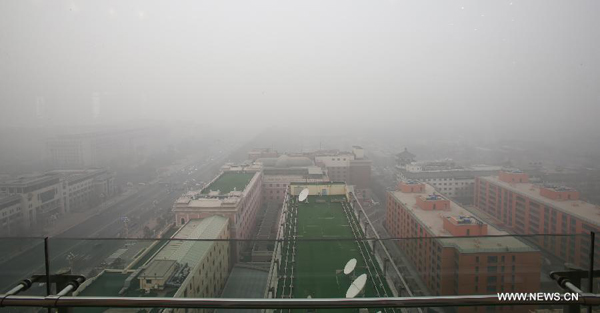Smog becoming key test for Chinese officials
 0 Comment(s)
0 Comment(s) Print
Print E-mail Xinhua, February 27, 2014
E-mail Xinhua, February 27, 2014
Smog has blanketed the Chinese capital for at least a week and the Great Hall of the People, where lawmakers will meet next week for the country's parliamentary session, is hardly visible.
|
Buildings and streets are shrouded by smog in Beijing, capital of China, Feb. 26, 2014. Many cities maintained alert for air pollution on Feb. 26 since fog and smog choked northern China days ago. [Photo/Xinhua] |
Much of north and central China, or one-seventh of the country, was covered in the pall over the weekend.
Responses have included reduced industrial activities, a ban on fireworks and barbecues, raised pollution alerts and vehicles being pulled from the roads.
Citizens are advised to stay indoors while schools have either stopped classes or suspended outdoor activities.
But the real battleground in the smog war is arguably still on the horizon, with air pollution sure to be high on the agenda of next week's parliamentary meetings. Lawmakers around the country have already proposed legally binding targets to curb pollution.
And Chinese officials, after a long period of prioritizing economic development over environmental protection, are now likely to see their future career shaped by how effectively they combat the rampant pollution.
Before gathering in the capital next week, local legislators and political advisors have announced goals to clear air pollution. At least 15 provinces have signed deals that promise "marked improvement" in air quality in five years.
Among them, Beijing plans to throw 760 billion yuan (124 billion U.S. dollars) into these efforts. Its neighboring province of Hebei vowed to depose any official that allows more steel or cement production than a mandated quota. Shanghai has also proposed better coordination with provinces on the Yangtze Delta in work to reduce emissions. FEELING THE PRESSURE
Wang Anshun, the mayor of Beijing, told media half-jokingly on the sidelines of Beijing's legislature meeting in January that leaders at the State Council will want his "head off his chest" if he fails to improve the capital's air quality by 2017.
While this could be a jest, the pressure Chinese officials carry on their shoulder is no laughing matter.
Tackling air pollution is the most urgent task for officials. It has become a key criteria for how they are judged, and the absence of progress over time could spell the end of their career.
Such concern keeps officials in Beijing on the edge of their seat. While the annual two sessions could likely begin under the choking smog, they will have little more than six months to prepare for a summit of the Asia Pacific Economic Cooperation in the fall. Hosting leaders around the Pacific rim under smothering conditions is the last thing they want on their record.
The smog hanging over Beijing will not clear unless its neighbors take concrete steps to reduce emissions. This has already exacted an economic toll on Hebei, the province that surrounds Beijing and produces a quarter of China's steel.
The capacity these steel mills added over the years has also spewed more particles into the northern Chinese sky. China Environmental News, a newspaper affiliated with the Ministry of Environmental Protection, reported in January that Hebei's goal to slash production of both coal and steel by 1.5 million tonnes this year could see the province lose 3 percent of its economic output.
"Steel, cement, glass, any extra ton of these products added in Hebei will put an end to an official's tenure," said Hebei Governor Zhang Qingwei in a recent interview.







Go to Forum >>0 Comment(s)